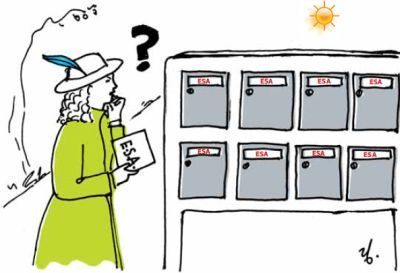In a multilingual environment like the European Commission, we often mix up our languages. Borrowing between French and English is common. For instance, ‘to control’ in English normally means ‘to command/direct’ or ‘to restrict/limit’.
It does not mean simply ‘to check/supervise’ like ‘controler’ in French. Using the wrong word can alienate readers, making the EU institutions look like a closed club that is out of touch with the real world. In the worst case, it can lead to misunderstandings and diplomatic incidents (for example, if you just want to say that Luxembourg is small, but you write that ‘Luxembourg is not an important country’).
| French |
False friend |
Why is it wrong? |
What's the correct word? |
| actuel |
actual |
'actual' means 'real' |
What's the correct word? |
| adequat |
adequate |
'adequate' means 'sufficient' |
current,.topical |
| assister a |
assist at |
'assist' means 'help'. |
suitable |
| attribuer |
attribute to |
'attribute to' means 'consider to be due to/characteristic of' |
attend, participate in |
| completer |
complete |
'complete' means 'finish' |
allocate to, assign to |
| delai |
delay |
'a delay ' means 'a postponement or hold-up'(= retard in French) |
deadline, time limit |
| elaborer |
elaborate (verb) |
'to elaborate' means 'to go into detail' |
draft, develop, produce |
| eventuel |
eventual |
'eventual' means 'ultimate' |
any |
| prevu |
foreseen |
'foreseen'.means.'predicted' |
provided for, planned |
| important |
important |
'important' is right if you mean 'significant'; but not if you mean> |
> large |
| materiel |
material |
'material' means 'matter', 'information' |
supplies,.equipment |
| opportunite |
opportunity |
'opportunity' means 'chance' |
advisability |
| perspectives |
perspectives |
'perspective' means 'standpoint' |
prospects, outlook |
| respecter |
respect |
'to respect' means 'to value' or 'honour' someone or something |
comply with (rules), meet (a deadline) |
| sensible |
sensible |
'sensible'.means.'reasonable' |
sensitive |
Avoid or explain jargon
Jargon is vocabulary used by any group of insiders or specialists to communicate with each other, and is acceptable in documents which are only read by that group.
However, outsiders (especially the general public) will have to work harder than they need to or want to when reading jargon. Some readers may even stop reading — so make sure that any document you want outsiders to read is as jargon-free as possible.
And if you DO have to use jargon terms in documents for the general public, explain them when you first use them, or add a glossary, a hyperlink or a reference to one of the websites indicated at the bottom of this page.
This non-exhaustive table contains a number of terms commonly used in the EU institutions:
| Jargon term |
Suggested definition |
| acceding country |
country about to join the EU |
| acquis (communautaire) |
body of EU law |
| candidate.country |
country still negotiating to join the EU |
| cohesion |
approach aimed at reducing social and economic disparities within the EU |
| comitology |
procedure under which the Commission consults committees of experts |
| Community method |
method developed for taking decisions in the EU, where the Commission, Parliament and Council work together |
| enlargement |
expansion of the EU to include new members |
| mainstreaming |
taking into account in all EU policies |
| proportionality |
principle that a level of government must not take any action that exceeds that necessary to carry out its assigned tasks |
| subsidiarity |
principle that, wherever possible, decisions must be taken at the level of government closest to citizens |
Take care with abbreviations
Too many unfamiliar abbreviations can make a document incomprehensible and send your reader to sleep:
(ERDF + EAGGF + CAP = ZZZ).
If the meaning of an abbreviation might not be clear to your reader, you should:
- write them out in full if the expression only occurs once or twice in the document; or
- spell them out when you first use them in a document, followed by the abbreviation-in brackets, and then use the abbreviation in the rest of the document; and/or ;
- attach a list of abbreviations or a hyperlink to show what they stand for.
The ‘Main Acronyms and Abbreviations’ section of the Interinstitutional Style Guide (
http://publications. europa.eu/code/'en/en-5000400.htm) defines many of the acronyms and abbreviations used in European Commission documents.
As always, consider your readers’ needs:
- Some readers will be irritated if ‘common’ abbreviations are spelled out.
- Writing ‘marketing authorisation holder’ on every other line instead of ‘MAH’ will make the document much longer.
Remember that abbreviations and acronyms can
mean different things in different contexts.
For example:
| ESA stands for: |
European Space Agency Euratom |
|
Euratom Supply Agency |
|
European System of Accounts |
|
Endangered Species Act |
|
Environmentally Sensitive Area |
|
Eastern and Southern Africa |
|
Electron Stimulated Adsorption and several other alternatives. |
Source:
http://iate.europa.eu